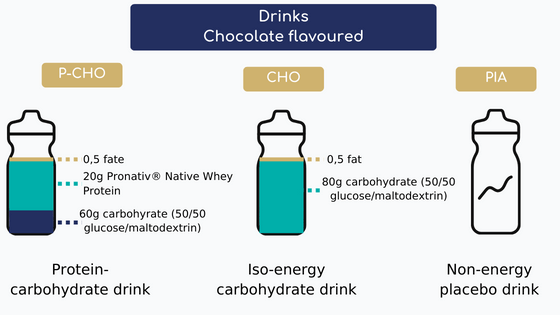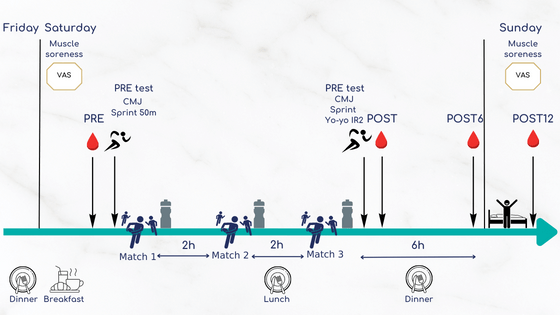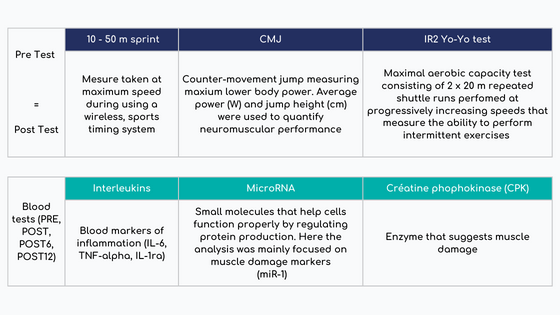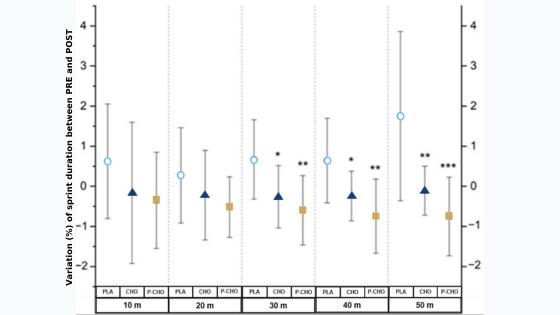
The effects of native whey protein consumption on athletic performance
In partnership with the INSEP (French National Institute of Sport), a study was conducted on the effects that Pronativ® – Native Whey Protein consumption had on athletic performance. The aim of the study was to investigate the effects of several nutritional drinks on maintaining physical performance and minimising muscle damage during seven-a-side rugby tournament days.
Introduction
Proteins are macromolecules. Their metabolism is affected during physical activity, mainly due to the deterioration of muscle cells. Protein loss during exercise is more significant during intense muscular exertion and/or physical contact (rugby, wrestling, ice hockey, judo, etc.). During sports activities, other changes also occur in the body. These include loss of water and electrolytes (sodium, potassium, etc.), depleted carbohydrate reserves and mobilisation of lipid (fat) reserves due to the energy needed for prolonged exercise. These losses are compensated for before, during and after the physical activity in the recovery phase. Diet and hydration are key factors for successful, healthy recovery. Dairy products and what are known as “recovery products” are good sources of water, proteins of high biological value, carbohydrates, vitamins, and minerals (vitamins A, B2, B12, phosphorus, zinc, calcium, selenium, etc.). The purpose of such products is to replenish carbohydrate reserves, rehydrate the body, eliminate toxins, and reduce the level of inflammation.
Previous studies [1-4] showed the benefits of consuming proteins and carbohydrates after prolonged physical activity to improve muscle protein synthesis and reduce muscle damage, but few studies examined the effects on performance. This study aims to determine the effects of recovery drinks that contain just carbohydrates, or a mix of native whey proteins and carbohydrates, to maintain physical performance and minimise muscle damage during a seven-a-side rugby tournament.
Procedure for studying the effect of native whey proteins on athletic performance
The study was “interventional” as it involved the use of a specific drink. It was “double-blind” because neither the participants nor the researchers knew who had which drinks. It was also “placebo-controlled” to ensure that any improvement seen in the specific drink group was due to the drink itself, rather than a placebo effect.

Figure 1: “double-blind” study
Finally, it is “randomised and cross-over” to reduce bias and exclude factors that could affect the results of the study. This study was conducted at the Research Department of the French National Institute of Sport (INSEP), on 12 male rugby players aged between 18 and 30. Each player participated in three days of simulated seven-a-side rugby tournaments over three weekends (one day per weekend). Athletes all followed the same training protocol during the three consecutive weekends but consumed different drinks each weekend.
Figure 2 shows a typical tournament day as repeated each weekend. The athletes arrived at the INSEP on the previous day and meals were standardised throughout the day. The next day, after lunch, the players had an initial blood test (PRE) and a physical test to determine a baseline (PRE test). Then they played three seven-a-side rugby matches, with a 2-hour rest period between each match and consumed drinks after each match. At the end of the three matches, the day ended with a session of POST tests and blood samples taken just after the post-tests (POST), 6 hours later (POST6) and 12 hours later (POST12). All players followed the same protocol during the three consecutive weekends.

![]()
Figure 2: Diagram of tournament days

Figure 3: Tests used during the study
The main results: native whey proteins in combination with carbohydrates can help sustain physical performance
With regard to physical performance, drinks containing Pronativ® – Native Whey Protein in combination with carbohydrates (PCHO) and those containing only carbohydrates (CHO) (to a lesser degree) probably have a positive effect compared to drinks that only contain water (PLA). As illustrated in Figure 3, after 30-40 m of sprinting, PCHO appears to have a likely positive effect on the maintenance of sprinting performance compared to PLA and the significance is more pronounced after 50 m. The same is true for CHO but to a lesser extent. Players who consumed a protein and carbohydrate drink were 64% more likely to perform better at 50 m compared to 6% for a carbohydrate only drink. Regarding average force (CMJ test), the drinks had no effect during repeated matches (PLA: 131 W increase, CHO and PCHO 59 W increase). However, they probably increased the ability to perform repeated intense exercises at the end of the tournament day (PCHO: 370 ± 117 m, CHO: 371 ± 134 m and PLA: 307 ± 139 m). Adding protein to the carbohydrate in the drink probably helped to regenerate glucogen when carbohydrate intakes were suboptimal.

Figure 4 : Variation in sprint performance at the end of the tournament day from PRE (before the start of the first simulated match), distances from 10 m to 50 m for each condition.
* indicates a difference compared to PLA (minor)
** moderate difference compared to PLA
*** significant difference compared to PLA
As for blood markers, drinks containing carbohydrates and Pronativ® (PCHO) resulted in a faster return to the baseline (PRE value) for pro-inflammatory and interleukin marker concentrations 12 hours after exercise (POST12) compared to the sugar drink (CHO) and the placebo drink (PLA). Therefore, consuming the protein drink limits exercise-induced inflammation. PCHO and CHO also probably reduced the concentration of injury-specific muscle microRNA immediately after match day compared to PLA. The results indicate that the increase in CPK (an enzyme that suggests muscle damage) is reduced between the PRE and POST6 tests with PCHO (+963.9± 837.4) compared to PLA (+1244.8 ± 617.2). Blood markers clearly show that the addition of protein to the recovery drink reduces muscle damage and leads to faster recovery.
With regard to muscle soreness, consuming carbohydrate-based recovery drinks, with or without protein, probably reduced exercise-induced delayed onset soreness, and pain felt when touched, compared to the control drink (PLA).
Conclusion
This original study tests the effects of Pronativ® – Native Whey Protein on physical performance under real-life conditions for the first time. The results suggest a probable positive effect of native whey protein combined with carbohydrate supplementation on physical performance, perception of muscle soreness, and muscle damage and inflammation blood biomarkers over a 24-hour recovery period.
Sources:
[1] B.C. Romano-Ely, M.K. Todd, M.J. Saunders, T.S. Laurent, Effect of an isocaloric carbohydrate-protein-antioxidant drink on cycling performance Med Sci Sport Exerc 2006;38:1608–1616. doi: 10.1249/01.mss.0000229458.11452.e9.
[2] M.J. Saunders, M.D. Kane, M.K. Todd, Effects of a carbohydrate-protein beverage on cycling endurance and muscle damage Med Sci Sport Exerc 2004;36:1233–1238. doi: 10.1249/01.MSS.0000132377.66177.9F.
[3] MJ Saunders, Coingestion of carbohydrate-protein during endurance exercise: influence on performance and recovery Int J Sport Nutr Exerc. Metab. 2007; 17:S87–S103. DOI: 10.1123/ijsnem.17.s1.s87.
[4] L Breen, K.D. Tipton, A;e; Jeukendrup, No effect of carbohydrate-protein on cycling performance and indices of recovery Med Sci Sport Exerc 2010;42:1140–1148. doi: 10.1249/MSS.0b013e3181c91f1a.















